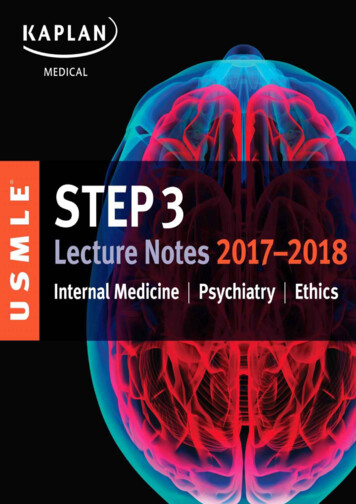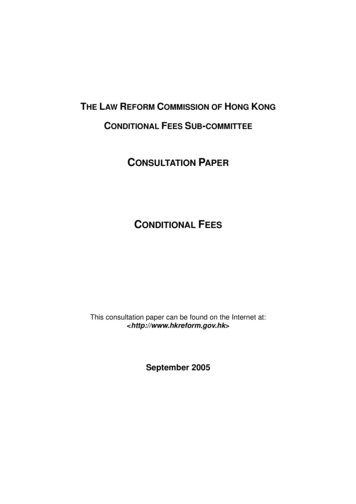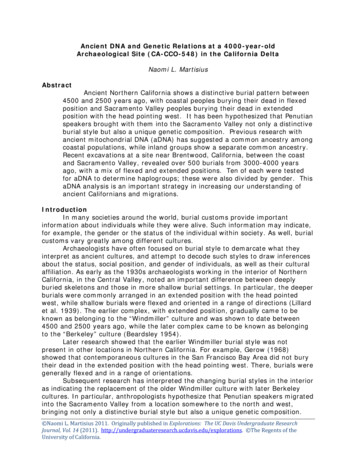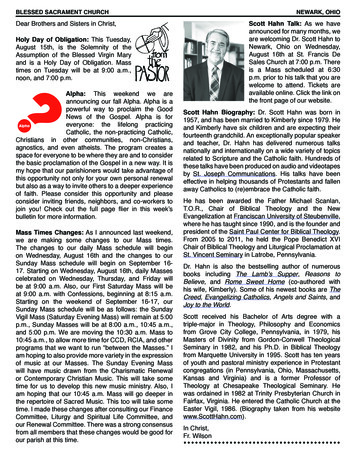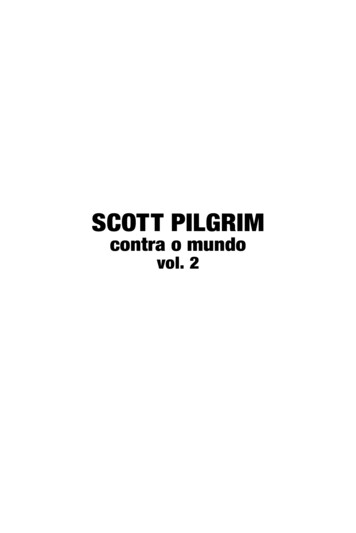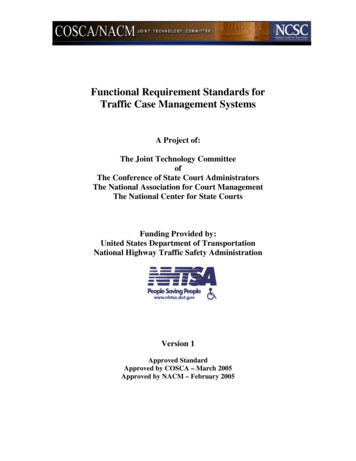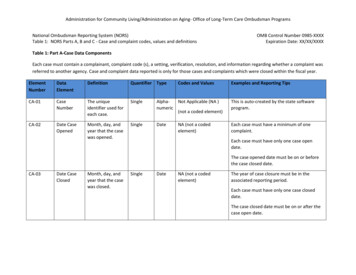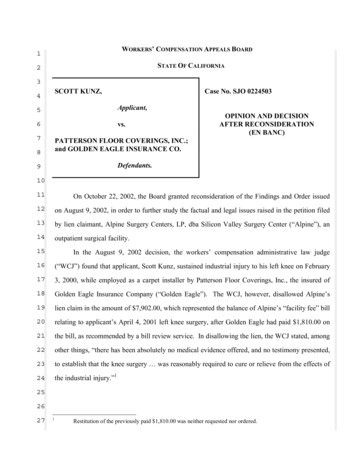
Transcription
WORKERS’ COMPENSATION APPEALS BOARD1STATE OF CALIFORNIA23SCOTT KUNZ,4Case No. SJO 02245035Applicant,6vs.7PATTERSON FLOOR COVERINGS, INC.;and GOLDEN EAGLE INSURANCE CO.8OPINION AND DECISIONAFTER RECONSIDERATION(EN BANC)Defendants.91011On October 22, 2002, the Board granted reconsideration of the Findings and Order issued12on August 9, 2002, in order to further study the factual and legal issues raised in the petition filed13by lien claimant, Alpine Surgery Centers, LP, dba Silicon Valley Surgery Center (“Alpine”), an14outpatient surgical facility.15In the August 9, 2002 decision, the workers’ compensation administrative law judge16(“WCJ”) found that applicant, Scott Kunz, sustained industrial injury to his left knee on February173, 2000, while employed as a carpet installer by Patterson Floor Coverings, Inc., the insured of18Golden Eagle Insurance Company (“Golden Eagle”). The WCJ, however, disallowed Alpine’s19lien claim in the amount of 7,902.00, which represented the balance of Alpine’s “facility fee” bill20relating to applicant’s April 4, 2001 left knee surgery, after Golden Eagle had paid 1,810.00 on21the bill, as recommended by a bill review service. In disallowing the lien, the WCJ stated, among22other things, “there has been absolutely no medical evidence offered, and no testimony presented,23to establish that the knee surgery was reasonably required to cure or relieve from the effects of24the industrial injury.”12526271Restitution of the previously paid 1,810.00 was neither requested nor ordered.
1In its petition for reconsideration, Alpine contended in substance: (1) under Labor Code2section 4603.2,2 if a defendant objects to any portion of a medical treatment bill, it must advise the3medical provider of the items being contested and the reasons for contesting these items, and, if a4bill reviewer does not recommend payment as billed, the bill reviewer must provide “a specific5explanation as to why the reviewer altered the procedure code or amount billed and the specific6deficiency in the billing or documentation that caused the reviewer to conclude that the altered7procedure code or amount recommended for payment more accurately represents the service8performed;” (2) in determining a medical treatment lien claim, the Board is limited to resolving9the specific objections made to the billing by the defendant and, here, Golden Eagle did not object10to Alpine’s charges on the basis that the April 4, 2001 left knee surgery was not medically11required; (3) at trial, Golden Eagle failed to rebut the testimony Alpine offered regarding the12appropriateness of the billing in this case; and (4) outpatient surgery centers are not subject to the13Official Medical Fee Schedule, and facility fees for such centers are reasonable if they do not14exceed the center’s usual and customary charges and are consistent with the charges of similarly15situated providers in the same geographic area.16Golden Eagle filed an answer to Alpine’s petition for reconsideration.17Because of the important legal issues presented, and in order to secure uniformity of18decision in the future, the Chairman of the Board, upon a majority vote of its members, has19reassigned this case to the Board as a whole for an en banc decision. (Lab. Code, §115.)3 Based20on our review of the relevant statutes, regulations, and case law, we conclude:21(1) under section 4603.2, a defendant’s failure to specifically object to a medical treatment22lien claim on the basis of reasonable medical necessity (or on any other basis) does not23effect a waiver of that objection;2425226327All further statutory references are to the Labor Code, unless otherwise noted.The Board’s en banc decisions are binding precedent on all Board panels and WCJs. (Gee v. Workers’Compensation Appeals Bd. (2002) 96 Cal.App.4th 1418, 1425, fn. 6 [67 Cal.Comp.Cases 236, 239, fn. 6];WCAB/DWC Policy & Procedure Manual, Index No. 6.16.1.)KUNZ, Scott2
1(2) the provisions of section 4603.2 do not apply unless the prerequisites to the section’s2application have been met, i.e., the medical treatment in question must have been3“provided or authorized by the treating physician selected by the employee or4designated by the employer [pursuant to section 4600]” and the medical provider’s5billing to the defendant must have been “properly documented” with an “itemized6billing, together with any required reports and any written authorization for services that7may have been received;”8(3) the Official Medical Fee Schedule applies to medical services provided, referred or9prescribed by “physicians” at an outpatient surgical facility;(4) the Official Medical Fee Schedule generally does not apply to outpatient surgery facility10fees, however, such fees nevertheless must be “reasonable;” and1112(5) in determining the reasonableness of an outpatient surgery facility fee, the Board may13take into consideration a number of factors, including but not limited to the following:14the medical provider’s usual fee and the usual fee of other medical providers in the15same geographical area, which means the fee usually accepted, not the fee usually16charged; the fee the outpatient surgery center usually accepts for the same or similar17services (both in a workers’ compensation context and in a non-workers’ compensation18context, including contractually negotiated fees); and the fee usually accepted by other19providers in the same geographical area (including in-patient providers).BACKGROUND2021Applicant sustained an admitted left knee injury on February 3, 2000.22On April 4, 2001, applicant had left knee surgery, performed by Michael Butcher, M.D., at23Alpine’s outpatient surgery center. Alpine billed for a total of 9,712.00 for three procedures, i.e.,24(1) 4,856.00 for a knee arthroscopy - lateral and medial menisectomies (CPT Code 29880),25(2) 2,428.00 for a chondroplasty (debridement) knee arthroscopy (CPT Code 29877), and26(3) 2,428.00 for a knee synovectomy (CPT Code 29876).4274The “CPT” codes are the Current Procedural Terminology codes of the American Medical Association.KUNZ, Scott3
12At some time not established by the present record, Alpine submitted its billing to GoldenEagle.3Thereafter, Golden Eagle sent Alpine’s billing to a bill review service. In a written4“explanation of review” statement served on Alpine, the bill review service allowed a payment of5 1,810.00 for the first procedure, which, it asserted, was the usual, customary and reasonable rate6in Alpine’s geographic area. The bill review service did not allow any payment for the other two7procedures, stating that they were being “denied according to the surgical record.” The bill review8service then issued a check to Alpine in the amount of 1,810.00.9On January 17, 2002, Alpine filed a lien for the 7,902.00 balance of its billing and, on10February 13, 2002, it filed a declaration of readiness to proceed to trial on the generic issue of its11“lien.”1213A mandatory settlement conference (“MSC”) took place on April 25, 2002. At the MSC,Alpine and defendant generically placed the “lien” in issue.14At the June 25, 2002 trial, the issues framed were, in essence: (1) liability for the lien of15 7,902.00, representing the difference between the amount billed by Alpine and the amount16allowed by the bill review service; (2) section 4603.2 penalties and interest to Alpine; and (3) a17section 5814 penalty to applicant. The parties placed in evidence Alpine’s 9,712.00 billing, Dr.18Butcher’s operative report (but no other medical reports), the bill review explanation, a copy of the19 1,810.00 check paid, a U.S. Department of Labor report (apparently, to show that labor costs in20Alpine’s geographic area are high), and some pages of CPT codes. Also, Alpine presented the21testimony of Steven F. Kanter, M.D., a “managing principal” at Alpine.22Dr. Kanter testified, in substance, that Alpine prepares a bill based on the procedures23specified in the operative report, that the three billing codes used here involve different parts of the24anatomy of the knee, that the fees charged here were those usually charged by Alpine, and that the25fees charged were less than those generally charged by other providers in the same geographic area.26He also stated that it was customary for providers to charge for secondary surgical procedures, but27to reduce the charges for the secondary procedures by 50-percent.KUNZ, Scott4
1On August 9, 2002, the WCJ issued his decision finding that Alpine had failed to establish2a prima facie case of entitlement to reimbursement and disallowing the lien. As noted above, the3WCJ’s Opinion recited, among other things, that “there has been absolutely no medical evidence4offered, and no testimony presented, to establish that the knee surgery was reasonably required5to cure or relieve from the effects of the industrial injury.”6DISCUSSION7I. Where Section 4603.2 Applies, A Defendant’s Failure To Timely Make SpecificObjections To A Medical Treatment Billing Does Not Result In The Waiver Of TheObjections.891011121314151617181920We will first consider whether the WCJ properly disallowed Alpine’s lien on the basis thatit failed to present medical evidence to establish that the knee surgery was reasonably required.Where a lien claimant (rather than the injured employee) is litigating the issue ofentitlement to payment for industrially-related medical treatment, the lien claimant stands in theshoes of the injured employee and the lien claimant must prove by preponderance of the evidenceall of the elements necessary to the establishment of its lien. (Lab. Code, §§3202.5, 5705; KaiserFoundation Hospitals v. Workers’ Comp. Appeals Bd. (Martin) (1985) 39 Cal.3d 57, 67 [50Cal.Comp.Cases 411, 418]; Industrial Indemnity Co. v. Industrial Acc. Com. (Lohnes) (1935) 2Cal.2d 397, 404-409 [20 IAC 311, 313-317]; Hand Rehabilitation Center v. Workers’ Comp.Appeals Bd. (Obernier) (1995) 34 Cal.App.4th 1204, 1210 [60 Cal.Comp.Cases 289, 291-292];Beverly Hills Multispecialty Group v. Workers’ Comp. Appeals Bd. (Pinkney) (1994) 26Cal.App.4th 789, 801 [59 Cal.Comp.Cases 461, 469-470].)21Alpine essentially contends, however: (1) Golden Eagle had an obligation under section224603.2 to timely and specifically state all of its objections to Alpine’s lien, including any23objection that applicant’s knee surgery was not reasonably required; and (2) because Golden Eagle24allegedly failed to object on the basis of reasonable medical necessity, it waived this objection25and, therefore, Alpine had no burden to come forward with any proof regarding this issue.2627KUNZ, Scott5
1We conclude that a defendant’s failure to specifically object to a lien on the basis of2reasonable medical necessity (or on any other basis) does not result in a waiver of that objection3under section 4603.2. It is true that section 4603.2(b)(2) requires a defendant to advise the4medical provider “of the items being contested [and] the reasons for contesting these items.” (Lab.5Code, §4603.2(b)(2) (emphasis added).) Yet, nothing in section 4603.2 states or implies that the6consequence of a defendant’s failure to make any particular specific objection is that the7defendant is thereafter precluded from raising that objection, or that the lien claimant is relieved8of any portion of its obligation to prove by preponderance of the evidence all of the elements9necessary to the establishment of its lien. To the contrary, the only potential consequences of a10defendant’s failure to timely state any given specific objection under section 4603.2 are: (1) the11defendant may become liable for a ten-percent penalty and/or interest, accrued from the date the12defendant received the lien claimant’s bill, on the unpaid balance of the lien allowed by the Board13(Lab. Code, §4603.2(b); Boehm & Associates v. Workers’ Comp. Appeals Bd. (Lopez) (1999) 7614Cal.App.4th 513 [64 Cal.Comp.Cases 1350]); and (2) the defendant may become liable for a15section 5814 penalty to the applicant, if the defendant’s failure to object and pay is unreasonable.16(Lab. Code, §4603.2(b).)517defendant will timely raise all specific objections, including (where appropriate) an objection that18the treatment rendered was not reasonably required to cure relieve the effects of an industrial19injury. (See, Lab. Code, §4600.) However, a defendant does not forever waive any specific20objection(s) it does not make.21///22///23///24///25///Because these potential consequences can be serious, a prudent26527A defendant’s failure to properly object under section 4603.2 may also subject it to audit penalties. (Cal. CodeRegs., tit. 8, §§10108(e), 10111(a)(9).)KUNZ, Scott6
1In reaching this conclusion, we are mindful of our decision in Otis v. City of Los Angeles2(1980) 45 Cal.Comp.Cases 1132 (Board en banc). In Otis, we interpreted former section 4601.5,3which had some similarities to section 4603.2.6 We held, in substance, that former section 4601.54required a defendant to make a specific and non-conclusionary written objection to the5reasonableness of any medical-legal bill within 60 days of its receipt and, if the defendant failed to6do so, it was precluded from raising (and the Board was precluded from considering) the7reasonableness of the medical-legal cost.8However, Otis does not compel a conclusion that, under section 4603.2, a defendant should9be deemed to waive any objection to a medical treatment billing that was not specifically made,10including (but not limited to) an objection that the treatment rendered was not reasonably required11to cure relieve the effects of an industrial injury.First, there are significant differences between medical-legal billings and medical treatment12A defendant may be liable for a medical-legal billing even where it is ultimately13billings.14determined that there is no industrial injury or that the employee’s claim is barred by the statute of15limitations. (Subsequent Injuries Fund v. Industrial Acc. Com. (Roberson) (1963) 59 Cal.2d 842,16843 [28 Cal.Comp.Cases 139, 139-140]; Beverly Hills Multispecialty Group, Inc. v. Workers’17Comp. Appeals Bd. (Pinkney) (1994) 26 Cal.App.4th 789, 802 [59 Cal.Comp.Cases 461, 471];18Turudich v. Industrial Acc. Com. (1965) 237 Cal.App.2d 455, 457-459 [30 Cal.Comp.Cases 316,19318-319].) A defendant, however, will not be liable for a medical treatment billing if there was no20industrial injury (Lab. Code, §4600) or if the injury claim is time-barred. (Lab. Code, §5404.)21Also, because medical-legal cost claims generally are relatively simple, the policy adopted in Otis22to largely remove such claims from the litigation process was appropriate. Claims for medical23246252627Former section 4601.5 had provided, in relevant part, that unless payment of a medical-legal billing was madewithin 60 days of receipt, “that portion of the billed sum then unpaid shall be increased by 10 percent, together withinterest thereon at the rate of 7 percent per annum.” It further provided, among other things: “Where the employerwithin the 60-day period, contests the reasonableness and necessity for incurring such fees, services, and expenses,payment shall be made within 20 days of the filing of an order of the appeals board directing payment.”KUNZ, Scott7
1treatment costs, however, are not nearly so simple and straightforward.7 Finally, the amounts in2issue in medical treatment lien litigation are often significantly greater than the amounts involved3in medical-legal lien litigation.4Second, the medical-legal cost provisions of section 4601.5 were repealed by the5Legislature in 1984 (Stats. 1984, ch. 596, §3) and were replaced by sections 4620 et seq.6Although, notwithstanding the repeal of section 4601.5, “[t]he reasoning of the Otis decision7continues to be sound” in some respects (American Psychometric Consultants, Inc. v. Workers’8Comp. Appeals Bd. (Hurtado) (1995) 36 Cal.App.4th 1626, 1640 [60 Cal.Comp.Cases 559, 569]),9the fact remains that, since Otis, there have been “major revisions” and a “massive [legislative]10effort to strengthen and clarify the perceived weaknesses” in the procedures pertaining to medical-11legal billings. (American Psychometric Consultants, Inc. v. Workers’ Comp. Appeals Bd.12(Hurtado), supra, 36 Cal.App.4th at pp. 1641, 1643 [60 Cal.Comp.Cases at pp. 570, 571].) In13particular, under sections 4620 et seq., a defendant now can raise (and the Board can consider)14certain objections to a medical-legal billing, even if those objections were not specifically raised15within 60 days of the receipt of the billing. (Lab. Code, §4622(d) [“Nothing contained in this16section shall be construed to create a rebuttable presumption of entitlement to payment of an17expense upon receipt by the employer of the required reports and documents. This section is not18applicable unless there has been compliance with Sections 4620 and 4621.”]; see also, American19Psychometric Consultants, Inc. v. Workers’ Comp. Appeals Bd. (Hurtado), supra, 36 Cal.App.4th20at pp. 1641-1645 [60 Cal.Comp.Cases at pp. 569-573] [holding that a defendant is not liable for21medical-legal costs under section 4622 unless there has been compliance with sections 462022(contested claim) and 4621 (medical-legal expenses reasonably, actually, and necessarily23242526277For example, a defendant can be liable for the cost of treatment for a non-industrial condition, if the evidenceestablishes that such treatment is reasonably required to cure or relieve the effects of an industrial injury. (Lab. Code,§4600; Braewood Convalescent Hospital v. Workers’ Comp. Appeals Bd. (Bolton) (1983) 34 Cal.3d 159,165-166 [48Cal.Comp.Cases 566, 570]; Granado v. Workmen’s Comp. Appeals Bd. (1968) 69 Cal.2d 399, 405-406 [33Cal.Comp.Cases 647, 652]; Abdala v. Aziz (1992) 3 Cal.App.4th 369, 376 [57 Cal.Comp.Cases 94, 97]; Dorman v.Workers’ Comp. Appeals Bd. (1978) 78 Cal.App.3d 1009, 1020 [43 Cal.Comp.Cases 302, 309]; Vela v. Workmen’sComp. Appeals Bd. (1971) 22 Cal.App.3d 513, 520-521 [36 Cal.Comp.Cases 807, 812-813].)KUNZ, Scott8
1incurred)]; Del Rio v. Quality Hardware (1993) 58 Cal.Comp.Cases 147 (Board en banc); Apex2Medical Group v. Workers’ Comp. Appeals Bd. (Real) (1994) 59 Cal.Comp.Cases 743 (writ den).)3Nevertheless, although there has been no waiver of the issue of whether applicant’s knee4surgery was reasonably required, we will remand to allow the parties to present evidence (or reach5a stipulation) regarding that issue. This is because, based on the generic “lien” issues framed by6the parties at the MSC and trial (and based on the absence of any evidence in the record that7Golden Eagle objected to the surgery on the ground it was not reasonably required), we conclude8the parties (or, at least, Alpine) understandably did not anticipate that this question might be in9issue.10II. The Provisions Of Section 4603.2 Apply Only Where Its Prerequisites Have Been Met.11In any event, it is not clear that section 4603.2 even applies to Alpine’s lien claim. Before a12lien claimant can invoke the provisions of section 4603.2, it must establish that the prerequisites13to that section’s application have been met.14First, section 4603.2 does not apply unless the medical treatment in question was “provided15or authorized by the treating physician selected by the employee or designated by the employer16[pursuant to section 4600].” (Lab. Code, §4603.2(a) & (b).)8 Thus, the statute provides that17defendants are potentially subject to penalties and interest only if they do not promptly pay (or18contest) billings for medical treatment provided or authorized by the primary treating physician.919However, there appears to be no similar legislative concern about other medical treatment.1020212223242526278See also, Cal. Code Regs., tit. 8, §9792.5(a)(5) & (b) [providing that, within 60 days, the defendant must payor contest the billings of the “treating physician,” with that term defined to mean “the one physician managing the careof the injured employee who has been selected by the employee pursuant to Labor Code section 4603.2”]; cf., Cal.Code Regs., tit. 8, §9784 [the employer shall promptly authorize the primary treating physician to provide allreasonably required medical treatment].)9We note that the primary treating physician must periodically report to the defendant, including providingtreatment plans (Lab. Code, §§ 4061.5, 4603.2(a); Cal. Code Regs., tit. 8, §9785(d), (e), (f), & (g)) and, if a disputearises over the treatment prescribed by a primary treating physician, the employee and the defendant must followspecific dispute resolution procedures. (Lab. Code, §4061, 4062.) There are no comparable provisions with respect totreatment rendered by or obtained from other physicians.10This does not mean that a defendant is not liable for, and a lien claimant cannot seek payment for, anyreasonably required medical treatment that is not “provided or authorized” by the primary treating physician. It merelymeans that the procedures and remedies of section 4603.2 are not applicable to such treatment.KUNZ, Scott9
1Second, section 4603.2 applies only where the medical provider’s billing to the defendant is2“properly documented,” i.e., the section does not apply unless the medical provider has provided3the defendant with an “itemized billing, together with any required reports and any written4authorization for services that may have been received.” (Lab. Code, §4603.2(b).)5Here, Alpine did not present any evidence regarding who, if anyone, was applicant’s6properly designated primary treating physician. Further, assuming there was a properly designated7primary treating physician, Alpine did not present any evidence regarding whether that physician8performed or authorized the surgery. Moreover, the parties made no stipulations regarding these9issues.1110Also, there are serious questions regarding whether Alpine submitted a “properly11documented” and “itemized” billing to Golden Eagle. As discussed above, Alpine’s billing merely12consisted of three CPT codes, with three corresponding brief descriptions of three surgical13procedures. From the CPT pages that Alpine offered in evidence, however, it appears the CPT14codes utilized by Alpine relate only to the surgical procedures themselves (i.e., the services15performed by the physician).16applicant was at the outpatient surgery center (and, very generally, what happened while he was17there). In any event, Alpine’s billing does not set forth what specific services it actually provided18in connection with applicant’s surgical procedures. For example, although Dr. Butcher’s operative19report reflects that applicant was given general anesthesia, Alpine’s billing does not reflect whether20it provided the anesthetic. Similarly, although Dr. Butcher’s operative report reflects that various21instruments and supplies were used (e.g., a Stryker arthroscope, a Mitek thermal radio frequency22probe, a shaver, mechanical instruments, a pain pump catheter, Steri-Strips, sterile dressing, a236-inch Ace bandage, and crutches), Alpine’s billing does not reflect whether it provided these24instruments and supplies. Also, although it might be inferred that Alpine provided the operatingThus, it appears that Alpine’s billing merely establishes why25112627Although the medical reports filed with the recently submitted stipulations with request for award suggest thatDr. Butcher (who performed the April 4, 2002 left knee surgery) was applicant’s primary treating physician, thesereports are not presently in evidence. (Cal. Code Regs., tit. 8, §10600 [“The filing of a document does not signify itsreceipt in evidence.”].)KUNZ, Scott10
1room and recovery room, the time period that these rooms were in use for applicant, and the rates2at which these rooms were charged, are not specified. Further, Alpine’s billing does not specify3what medical support staff (other than physicians) Alpine provided during the course of the pre-4operative preparations, the operation itself, or the post-operative recovery (and it does not specify5the time expended and the rate(s) charged for any medical support staff).6Of course, where the Board’s record is not adequately developed to permit the reasoned7resolution of the issues before it, it may direct the further development of the record. (See, Lab.8Code, §§133, 5701, 5906, 5908; Kuykendall v. Workers’ Comp. Appeals Bd. (2000) 799Cal.App.4th 396, 403-406 [65 Cal.Comp.Cases 264, 268-269]; Tyler v. Workers’ Comp. Appeals10Bd. (1997) 56 Cal.App.4th 389, 392-395 [62 Cal.Comp.Cases 924, 926-928]; Raymond Plastering11v. Workmen’s Compensation Appeals Bd. (King) (1967) 252 Cal.App.2d 748, 753 [3212Cal.Comp.Cases 287, 291]; West v. Industrial Acc. Com. (Best) (1947) 79 Cal.App.2d 711, 71913[12 Cal.Comp.Cases 86, 89].) Here, for the reasons outlined above, the record is not adequately14developed for us to conclude whether section 4603.2 applies to Alpine’s lien, so we will remand15the matter for development of the record.16III. The Official Medical Fee Schedule Applies To Medical Services Provided, Referred OrPrescribed By “Physicians” At An Outpatient Surgical Facility.1718192021222324Alpine asserts that outpatient surgery centers are not subject to the Official Medical FeeSchedule under any circumstances. It also asserts that fees for such centers are reasonable if theydo not exceed the center’s usual and customary charges and are consistent with the charges ofsimilarly situated providers in the same geographic area.We do not agree (if Alpine is so asserting) that the Official Medical Fee Schedule isentirely inapplicable to all services performed at an outpatient surgery center.Administrative Director Rule 9791 (Cal. Code Regs., tit. 8, §9791 states, in relevant part:“Except as provided in this article, the Official Medical FeeSchedule applies to all covered medical services provided, referredor prescribed by physicians (as defined in Section 3209.3 of theLabor Code), regardless of the type of facility in which the medical252627KUNZ, Scott11
services are performed, including clinic and hospital-basedphysicians working on a contract basis.” (Cal. Code Regs., tit. 8,§9791 (emphasis added).)123Moreover, page 1 of the General Instructions of the Official Medical Fee Schedule states:4“Outpatient procedures and services which are included in this feeschedule and which are provided in the emergency room oroperating room of a hospital or in a freestanding outpatientsurgery facility shall be reimbursed in accordance with this feeschedule.” (Emphasis added.)5678Thus, medical services provided, referred or prescribed by physicians at an outpatient facility are9covered by the Official Medical Fee Schedule12 and, in general, the reasonable value of such10medical services will be established by the relevant unit values and conversion factors. (See Cal.11Code Regs., tit. 8, §§9791, 9791.1, 9792, 9792.1.) That is, to obtain a fee in excess of the12reasonable maximum, the “medical service” provider must submit an itemization and (1) show that13the requested fee is reasonable and is not in excess of the provider’s usual fee; and (2) explain the14extraordinary circumstances, related to the unusual nature of the services rendered. (Lab. Code,15§§5307.1(b), 5307.6(b); Cal. Code Regs., tit. 8, §§9792(c), 9792.5(c).)16Here, it is not clear whether Alpine’s billing included the services of Dr. Butcher or any17other physician. Accordingly, we will remand on that question.18IV. The Official Medical Fee Schedule Generally Does Not Apply To Outpatient SurgeryFacility Fees, However, Such Fees Nevertheless Must Be “Reasonable.”19We do agree with Alpine, however, that outpatient surgery facility fees generally are not202122subject to the Official Medical Fee Schedule. Administrative Director Rule 9791 (Cal. CodeRegs., tit. 8, §9791) provides, in relevant part:“Nothing contained in this schedule shall preclude any hospital asdefined in subdivisions (a), (b), or (f) of Section 1250 of the Healthand Safety Code, or any surgical facility which is licensed undersubdivision (b) of Section 1204 of the Health and Safety Code, or232425262712Although section 5307.1(a)(1) specifically refers to medical facilities licensed under Health and Safety Codesection 1250 (i.e., medical facilities to which patients are admitted for a 24-hour stay or longer), this languageconstitutes language of inclusion, not of exclusion and limitation.KUNZ, Scott12
any ambulatory surgical center that is certified to participate in theMedicare program under Title XVIII (42 U.S.C. Sec. 1395 et seq.)of the federal Social Security Act, or any surgical clinic accreditedby the Accreditation Association for Ambulatory Health Care(AAAHC), from charging and collecting a facility fee for the use ofthe emergency room or operating room of the facility.” (Cal. CodeRegs., tit. 8, §9791 (emphasis 627Although Rule 9791 refers to a facility fee “for the use of the emergency room or operating roomof the facility,” this language does not appear to specifically limit “facility fees” to emergencyroom or operating room fees. Rather, the term “facility fee” appears to include all servicesprovided at an outpatient surgery center, except for the professional medical services provided,referred or prescribed by a surgeon, assistant surgeon, anesthesiologist, or other “physicians”within the meaning of section 3209.3 et seq. (Cal. Code Regs., tit. 8, §9791; see also, Lab. Code,§§5307.1(a)(2); 5307.21(a)(1) [effective January 1, 2003.].) Thus, without now deciding thequestion, a “facility fee” might include charges for the operating room, the recovery room, nursingservices, medicines, medical and surgical supplies, and medical apparatus. (See, Lab. Code,§§3209.5, 4600.)V. Factors To Be Considered In Determining Reasonableness Of A Facility Fee.Although facility fees are not subject to the Official Medical Fee Schedule, any facil
In the August 9, 2002 decision, the workers' compensation administrative law judge ("WCJ") found that applicant, Scott Kunz, sustained industrial injury to his left knee on February . Workers' Comp. Appeals Bd. (Martin) (1985) 39 Cal.3d 57, 67 [50 . WORKERS' COMPENSATION APPEALS BOARD STATE OF CALIFORNIA .
